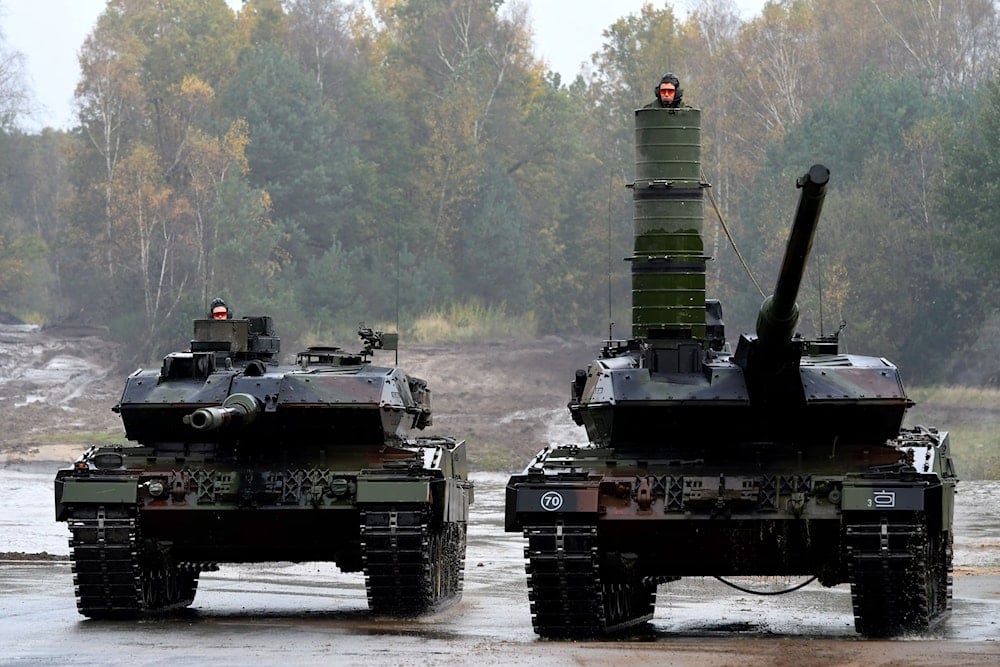Chancellor Merz under pressure over German military conscription
Germany’s coalition government is divided over the Military Service Modernization Act, with the Christian Democratic Union pushing the state to adopt a mandatory service year.
-

German soldiers operating Leopard 2A7 main battle tanks are shown during a military exercise at the military training area in Munster, northern Germany, in 2017 (AFP via Getty Images)
Germany’s ruling coalition is preparing for a sharp political dispute over the future of the German military, with Chancellor Friedrich Merz under growing pressure from within his own party, the Christian Democratic Union (CDU), to take a firmer stance on conscription. On August 27, the Cabinet will review the Military Service Modernization Act, a bill designed by Defense Minister Boris Pistorius of the SPD to address the Bundeswehr’s persistent personnel shortages without fully reinstating mandatory service.
Under Pistorius’ proposal, all draft-age men would have to register and undergo screening, with only a targeted number called up for service, while women could volunteer. The government’s aim is to add around 5,000 voluntary soldiers annually for terms of up to 23 months. Crucially, mandatory service would only be activated through a separate parliamentary vote, a safeguard strongly supported by the SPD but questioned by Merz’s conservative allies.
Members of the Christian Democratic Union are pushing for a tougher approach. They want the legislation to include a compulsory service year, offering either military service or civilian roles in areas such as healthcare and education. CDU leaders also oppose the bill’s requirement for a parliamentary vote before activating conscription, arguing it undermines deterrence.
“If conscription is only activated in a heightened military crisis, it becomes a reaction tool rather than a deterrent,” said CDU foreign and defense policy lead Norbert Röttgen. He accused Pistorius of focusing solely on voluntarism without clear targets or an automatic trigger for conscription.
This position reflects pressure on Merz to back a more assertive defense policy that secures long-term manpower for the Bundeswehr. CDU figures believe that without binding provisions for mandatory service, the military will struggle to meet its operational needs.
Read more: Germany moves to secure US military presence amid fears of US drawdown
SPD defends voluntary military recruitment model
The SPD maintains that the Bundeswehr is a “parliamentary army", meaning the legislature, not the executive, must decide on introducing compulsory service. SPD lawmaker Andreas Schwarz argued that the voluntary model is more sustainable, saying, “We want people who want to be there. If you begin with compulsion, you create resistance.”
According to Schwarz, attracting volunteers is more likely to produce trained personnel who commit to longer service terms. The goal, he stressed, is to make service appealing enough to meet recruitment targets without mandatory measures.
Dispute over parliamentary control of conscription
At the heart of the debate is whether compulsory service should require parliamentary approval during a crisis. The CDU argues that waiting until an emergency to activate conscription risks losing deterrence and public support. The SPD insists on keeping legislative oversight as a safeguard against overreach.
Behind the scenes, high-level meetings between CDU and SPD representatives have failed to narrow the gap. Pistorius has rejected CDU proposals to remove the parliamentary trigger, defending the bill’s current framework.
With the Cabinet set to review the bill on August 27, time is running short for a compromise. If the dispute is not resolved beforehand, conservatives plan to push amendments during the Bundestag’s legislative process this fall. CDU lawmakers, including Bundestag Defense Committee Chair Thomas Röwekamp, expect changes to be made during parliamentary consultations.
Another possible route is the coalition committee, where top party leaders meet privately to settle contentious issues. While decisions there carry political weight, they still require formal approval from the government or parliament.
Read more: Merz reluctantly defends partial weapons embargo to 'Israel'

 4 Min Read
4 Min Read










